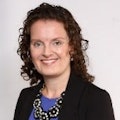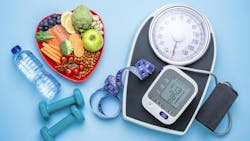What does healthy mean, anyway?
What does health mean to you? If you're a dental provider, you may think of patients who don't have any oral health issues, people who are active, slim, and value exercise. But health is more than the absence of disease. A 2022 study in the Journal of the American College of Cardiology found that, from 2017-2018, less than 7% of US adults are cardiometabolically healthy, meaning they have optimal blood pressure, glucose, triglycerides, cholesterol, and waist size without medication.1
As health-care providers, we're part of the communities we serve. Research shows people trust health advice from those who appear healthy. Dental professionals should ask themselves the following questions: Are we healthy? Are we caring for ourselves enough to serve others? Our health is vital to providing good care. Now is the time to focus on our health to serve patients better.
Our typical clinical day
With a morning filled with early patients, running lines, reviewing charts, stocking our rooms, and greeting our teams, we may not have time to drink water or use the restroom before lunchtime creeps up on us. We work long days that often feel like a marathon. We catch up with patients, review health histories, complete head and neck exams, conduct caries risk assessments, and perform countless other critical steps to ensure our patients receive comprehensive, high-quality care.
Our break rarely offers a true escape from the office, as many use it to call patients and write charts, leaving little time to relax. Often, lunch is replaced by a quick snack.
Despite our demanding work, rewarding moments and connections give our days meaning, reminding us of our impact. However we all face breaking points. When that happens, it's vital to reflect and ask: Is this the true meaning of a healthy, fulfilling life?
When helping others hurts us
In our profession we measure and discuss health every single day, but it usually pertains to someone else. We assess vital signs, caries, periodontal status, sleep quality, and other factors. We discuss systemic connections, educate patients on inflammation and disease, and advocate for disease prevention.
How often do we truly assess our health? Many of us silently struggle with aches from repetitive work and weakened immune systems from chronic stress. We may also cancel or neglect our medical appointments due to busy schedules.
We do this because dentistry often rewards the hustle. We wear our packed schedules like a badge of honor. "Busy" has become a twisted definition of "successful." However, busyness is not health. It is often the mask we wear to avoid looking beneath the surface.
We advocate for our patients, but now it's crucial to advocate for ourselves. The effort needed to succeed as preventive specialists is substantial.
The illusion of health
We often see healthy patients with bright smiles and joyful greetings, but deeper questions reveal issues like sleepless nights, poor diets, and high blood pressure. This should inspire us to broaden our approach, sharing insights about the whole person, not just oral health.
Many dental professionals share the illusion. However, behind the scenes, they are often inflamed, under- or overnourished, lack rest, and are emotionally drained from trying to do it all.
Our approach to patient care has transformed how we view health. We see health as knowledge, closely linked to lived experiences influenced by trauma, stress, environmental factors, and exhaustion. We've encountered patients who value their health but lack the energy, time, or resources to improve it. Some may unfairly judge these patients for "not flossing" or "not caring."
We face the same challenges: skipping meals, experiencing stress, avoiding physical activity, and choosing convenience over proper nourishment. Instead of judging a patient, use this shared experience to be compassionate and reflect. Consider asking the following questions:
-
What barriers is this patient facing?
-
Have they been educated in a way that makes sense to them?
-
Are they coping with trauma that influences their actions?
-
Most importantly, are we truly embodying the health we advise patients to seek?
This uncomfortable question reminds us that we also deserve compassion, just as our patients do.
How often do we ask?
During coaching or lectures, we often hear hygienists say they've learned something that will improve patient care and how they care for themselves and their families, but sometimes the most valuable lessons come from life itself. It's where we serve as our own best teachers.
To live joyfully and avoid burnout, we must broaden our view of health. Consider the six health dimensions dental professionals should evaluate.
-
Physical health: Sleep, hydration, and movement are essential for long-term vitality. Research shows that chronic fatigue and low-grade inflammation often lead to chronic disease.2
-
Mental and emotional health: Dentistry is highly prone to burnout. Emotional exhaustion without regulation leads to depression and disengagement.3 Therapy and support systems aren't optional; they're survival tools.
-
Nutritional health: Ultraprocessed foods constitute over 60% of the American diet and promote inflammation, insulin resistance, and oral dysbiosis.4
-
Environmental health: Toxic load, ergonomics, and noise affect long-term health. Dental professionals often face mercury vapor, radiation, and volatile sulfur compounds (VSC), impacting respiratory and hormonal health.5
-
Relational and social health: Poor team dynamics and ongoing conflict raise cortisol and emotional fatigue. Supportive relationships reduce stress and boost job satisfaction.
-
Purpose and spiritual health: A clear purpose reduces burnout, boosts resilience, and may extend life expectancy. Faith, service, and calling matter.6
Healing starts with us
Patients want more than white teeth; they seek overall well-being. They need answers, support, and clarity from someone who understands. When we are tired or overwhelmed, we can't effectively help others with their health. Healing starts with us. Prioritizing health isn't selfish-it's responsible. Here are strategies to reclaim and transform our well-being.
-
Schedule time to recover. Daily renewal comes from nature and stillness. You can't give your best if your cup is empty.
-
Fuel with intention. Protein-rich meals, high fiber foods, hydration, and less sugar are important. Start small, stay consistent. Small changes lead to lasting results.
-
Reconnect to your "why." Write it down, speak aloud, and share with family, team, and patients. Knowing your purpose can reduce burnout.
In conclusion, embracing health fosters not only personal well-being but also enhances the well-being of those we care for. By prioritizing our own health and integration of body, mind, heart, and purpose, we create a ripple effect that uplifts our communities and transforms lives.
Editor's note: This article appeared in the November/December 2025 print edition of RDH magazine. Dental hygienists in North America are eligible for a complimentary print subscription. Sign up here.
References
-
O'Hearn M, Lauren BN, Wong JB, et al. Trends and disparities in cardiometabolic health among US adults, 1999-2018. J Am Coll Cardiol. 2022. 12;80(2):138-151. doi:10.1016/j.jacc.2022.04.046
-
Calder, P. C., et al. (2021). The Role of Diet and Inflammation in Chronic Disease. Nature Reviews Immunology.
-
Rotenstein LS, Torre M, Ramos MA, et al. Prevalence of burnout among physicians: a systematic review. JAMA. 2018. 18;320(11):1131-1150. doi:10.1001/jama.2018.12777
-
Monteiro CA, Cannon G, Levy RB, et al. Ultra-processed foods: what they are and how to identify them. Public Health Nutr. 2019;22(5):936-941. doi:10.1017/S1368980018003762
-
Hazards in dentistry: chemicals, radiation, and ergonomic risks. National Institute for Occupational Safety and Health. 2020.
-
Hill PL, Turiano NA. Purpose in life as a predictor of mortality across adulthood. Psychol Sci. 2014;25(7):1482-6. doi:10.1177/0956797614531799
About the Author

Kerry Lepicek, RDH
With more than 20 years of clinical experience, Kerry Lepicek, RDH, is an international lecturer on oral biofilm, halitosis, oral-systemic connection, and the dental hygiene process of care. She is the editor for The Hygiene Corner with Women in Dentistry, serves on the advisory board for the American Academy for Oral Systemic Health, and is a cast member on The RDH View. Kerry recently received the Award of Distinction from the Ontario Dental Hygienists Association. Reach her at [email protected].

Machell Hudson-Hoover, RDH, CHC, FAAOSH
Machell Hudson-Hoover, RDH, CHC, FAAOSH, is the founder and CEO of Integrative Dental Coaching, as well as the head of Oral Systemic Health and Hygiene Growth for the Clinical Calibration Institute. Her mission is to support dental and medical health care professionals in transforming care from a reactive "sick care" approach to a proactive, health-minded approach. Machell is fiercely passionate about dental hygiene and is devoted to showcasing the crucial role dental professionals play as frontline leaders in healthcare, advocating for the profound impact of oral health on overall well-being. Machell can be reached at [email protected].
